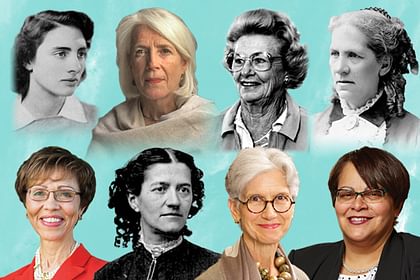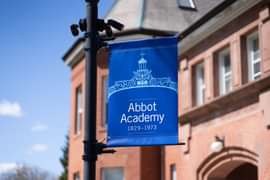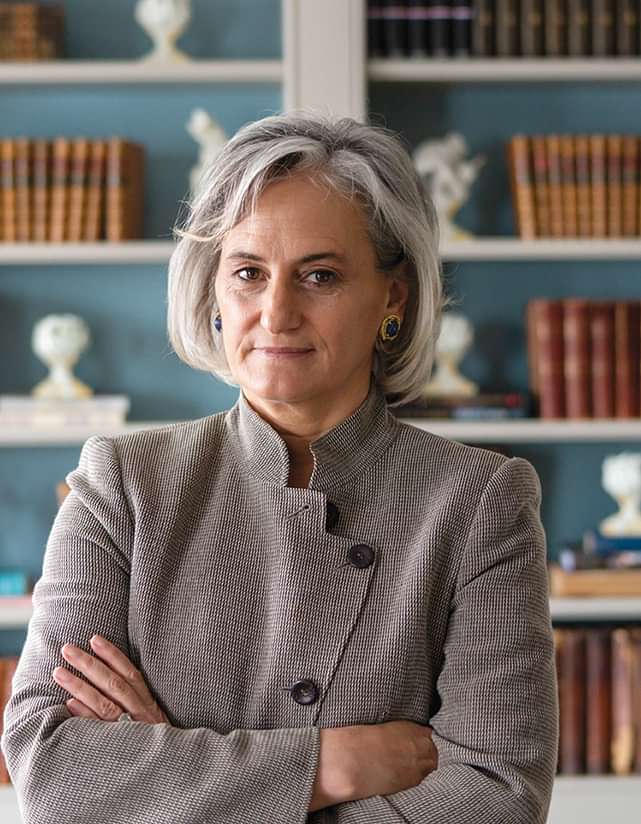
March 26, 2021
Legacy of leadership
Amy Falls ’82, P’19, ’21, talks about her latest role and the many women who have helped pave the wayby Allyson Irish & Tracy Sweet
Amy Falls knows all eyes are on her.
The first woman president of the Board of Trustees, Falls is acutely aware of the challenges and responsibilities of being first. She’s also aware of—and thankful for—the legacy of leadership left by many women who have come before her at Abbot Academy and PA, women who inspire her work to build a better Andover for future generations.
Uniquely positioned to lead the Academy—with experience as a student, alumna, parent, volunteer, benefactor, administrator, and co-chair of the Knowledge & Goodness campaign—Falls talks about her latest role, her partnership with the head of school, and what the future holds for Andover.
A Visionary Thinker
Amy Falls ’82, P’19, ’21, became the first woman to serve as president of the Board of Trustees—of Andover or Abbot—on July 1, 2020. Rather than focus on the centuries-long journey for women in the boardroom, though, Falls prefers to reflect on those who helped clear the way. Chief among them is Barbara Landis Chase, Phillips Academy’s first woman head of school (1994-2012).
“Barbara was an extraordinary educator and a powerful executive. She cultivated and promoted talent all around her,” says Falls, noting those on Chase’s senior team who have been recruited to top positions at other schools and organizations.
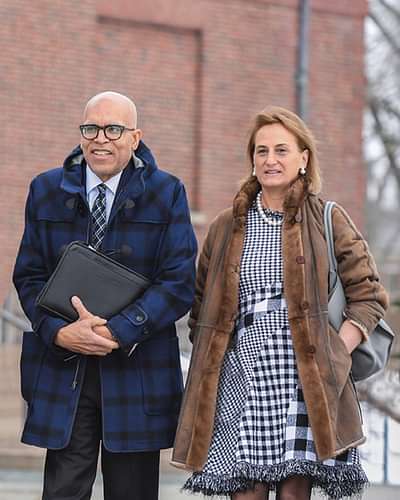 Falls and Kington walk together in December 2019 as he was formally introduced as the 16th Head of School to the campus community.
Falls and Kington walk together in December 2019 as he was formally introduced as the 16th Head of School to the campus community.
Chase and Falls blazed a trail together in 2005 when the school established its own investment office to oversee the endowment. Persuaded by Chase to become PA’s inaugural chief investment officer, Falls built a New York-based team and managed the endowment through both prosperous and challenging times. Under her watch, annual returns consistently finished in the top quartile or higher among similar-sized endowments.
After Falls left Andover to become CIO at Rockefeller University in 2011, she was subsequently appointed to Andover’s Board of Trustees. “I remember saying to Amy soon after she became a trustee that my dream was she might become the first woman to lead the board,” Chase says.
Nearly a decade later, Chase remains impressed. “I am so proud of all that Amy has accomplished. She is incredibly smart and always brought great institutional knowledge and a deep devotion to Andover to the boardroom.”
Now a senior search consultant with Carney, Sandoe & Associates, Chase has worked to bring more women into top academic and administrative positions in schools and speaks and writes on women’s leadership topics. “Being the first woman to do anything has its challenges, but Amy certainly earned this position and, like all great executives, she will be a leader for all.”
Amy Falls will step down as CIO at Rockefeller University this summer to become CIO at Northwestern University, where she will manage a $12.2 billion endowment. Falls also serves on the boards of the Ford Foundation and the Harvard Management Corporation.
In 2019, as board president-elect, Falls’ first priority was to chair the search for Andover’s 16th head of school. The world has changed dramatically during the two years since that search began. Today, she and Head of School Raynard S. Kington MD, PhD, P’24, continue to build their partnership as Andover—in the midst of a global pandemic and against a backdrop of political and racial divisions—navigates one of the most challenging periods in its 243-year history.
“Our leadership, to this point, has only seen Andover in pandemic mode,” says Kington, who shares Falls’ perspective that the community will emerge stronger having gone through this period of turmoil. “Even during the most intense, stressful moments, Amy has remained poised and optimistic, focused on solutions, and open to hearing all perspectives,” he says. “Those traits are foundational to our partnership and central to everything we will do going forward.”
When you are the first of anything, all eyes are on you. It has a huge resonance and it’s a big responsibility.
”Q&A
Who are some influential women from Abbot and PA that have inspired you?
First and foremost, Barbara Chase. Her leadership has been so important to the Academy, akin I would say to Sarah Abbot in terms of impact. Barbara is what they call a classic Level 5 CEO, a mix of powerful ambition and generosity of spirit. Barbara shaped the Andover of today, and many of the women on her leadership team, like Becky Sykes and Jane Fried, have gone on to lead other important institutions. Barbara mentored so many other women and she was ahead of her time in many ways—need-blind admission, race, and LGBTQ issues. Under her leadership, Andover moved into a more competitive position.
Another important woman is Linda Carter Griffith, who has been a powerful champion and voice for students of color. She’s worked with trustees on diversity, equity, and inclusion issues, helped me to identify some of my own blind spots and, in general, has given us all a sharper lens through which to consider complex issues of race and our own personal struggles. She has given voice to a lot of things that have really helped our community, and helped me, personally.
When I look back on my time as a student, Kathy Dalton sticks out as absolutely one of my favorite and most influential teachers. Number one, she taught me how to make an outline and how to take notes. I still use that skill! Number two, she had a tremendous love of history and of the evolution of constitutional thinking. She was inspiring as a woman, and she was willing to talk about gender-related challenges. She was willing to share personal stories, and I remember thinking about how women were viewed and how to take charge of that. I was inspired both in terms of academics and in terms of aspirational thinking.
What does it mean to be the first woman president of the board?
When you are the first of anything, all eyes are on you. I’m thinking of how Barbara Chase must have felt as the first woman head of school. It has a huge resonance and it’s a big responsibility.
Candidly, there were moments this past year during the pandemic when I was feeling like, ‘this is just really hard for this board, for this school, at this moment in time.’ But what kept me going was the realization that failure is not an option; it’s too important. Andover is too important.
Being first, I think there’s an extra burden of responsibility to do it well. Andover has been ready for a woman board president for some time, but it just didn’t fall out that way. In doing some reading, I was surprised to learn that Abbot Academy had never had a woman board president. It just spoke to me about the ways in which women have occupied certain zones and not others.
We want Andover to be a place that unleashes excellence, that puts young people out in the world who have the ability to analyze problems, create and communicate solutions, and empathize with others.
”What are your views on women and philanthropy?
I have for a while been interested in how women use their economic success to enhance their philanthropic impact. To me, philanthropy is a pivotal component of leadership and it’s something that women are still learning how to navigate.
I think this stems from a decades-old notion of women feeling like they weren’t in control financially. That has changed, thankfully, along with the evolution of women becoming powerful philanthropists, which is important. It’s about women being powerful in boardrooms, it’s about women being powerful in philanthropy and using it to advance a greater good. It’s about women really taking a seat at the table to decide on how resources are allocated.
I’ve found it very interesting to read about the early years of Abbot Academy. It was all Sarah Abbot’s money. Let’s just get that clear. But she did not decide how to spend it. There were a bunch of guys and they got the money from her. Then they made the decisions about where the building was going to go, what the building was going to be.
There are a lot of women who run schools, founded schools, created educational movements. But the area of financial stewardship has been one place that women have not always occupied. I think that’s interesting and it’s something I’d like to pursue more as board chair
How would you describe your partnership with the new head of school?
I’m very excited about Raynard’s leadership and his aspirations for Andover. He has a deep curiosity about his job and an abiding commitment to excellence.
When we first met, it was in the basement of the Chicago O’Hare Hilton Hotel. I’d flown from New York and he’d flown from Iowa. Others on the search committee had flown in too. We were in this windowless, airless, generic, white-walled conference room. And yet, Raynard was so impressive with a combination of powerful intellect, curiosity, a passion for education, enormous courage, and a sense of humor. I was thinking this is exactly what we need. This is a person who thinks deeply and rigorously and questions everything.
One of the things I have noticed is that Raynard considers things from first principles as opposed to just relying on, “this is what other people say or what we have always done.” He’s a very rigorous thinker and I admire that. My own thinking has evolved based on our conversations. I find it really exciting to have a partner who helps to challenge my own thinking.
The other thing that I think is critical—and that is common across all of the leaders I’ve known at Andover—is a profound focus on serving the students and the broader society. Raynard was clearly drawn to the purpose and the power of this institution. He has lived a non sibi life and is a great role model for our students.
I think that a crisis can really highlight areas for improvement. It’s painful, but if you don’t use it as an opportunity to identify where you’re vulnerable, then you miss an opportunity to grow. Nobody wants to go through these things, but at least you can take what it has to teach you.
”How would you characterize Andover’s mission in action?
We want Andover to be a place that unleashes excellence, that puts young people out in the world who have the ability to analyze problems, create and communicate solutions, and empathize with others, particularly those whose views differ from their own. People who have a deep understanding of the world around them. That’s a very powerful service and mission.
What is your approach to leading an effective board meeting, especially with so many strong personalities in the room?
That’s an important question. My predecessor, Peter Currie, was a master at creating an inclusive culture on the board so that people really felt heard. It’s critical to allow and encourage all voices. At the same time, you have to foster an environment where we debate, we talk, we express our points of view, and then we rally around an outcome.
The pandemic, like any crisis, probably brought out the differences more. We’ve had some tough conversations, but I feel that the underlying love for the institution creates enough glue that we can have open debate and not take anything personally. And that is an important dynamic that sets us up for stronger decision-making.
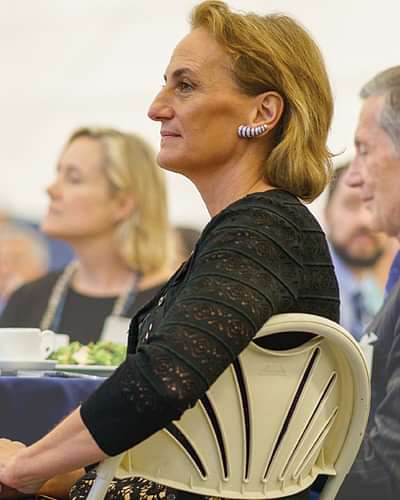 Falls says the pandemic has put into high relief the value of an Andover education and of having students from all walks of life come together and thrive. As the parent of an alumna (Alice ’19) and a current student (Athena ’21), she has seen the positive impact of Andover’s diverse community.
Falls says the pandemic has put into high relief the value of an Andover education and of having students from all walks of life come together and thrive. As the parent of an alumna (Alice ’19) and a current student (Athena ’21), she has seen the positive impact of Andover’s diverse community.
PA is an expensive enterprise to run: need-blind admission, curricular innovation, and a commitment to diversity, equity, and inclusion. As co-chair of the Knowledge & Goodness campaign, how crucial is it that PA hit its financial goals?
The campaign is crucial to Andover’s continued strength. Not only does it advance faculty and student initiatives, but it also addresses some deficiencies. For example, the new Snyder Center and the Pan Athletic Center, which is currently under construction, are keys to having facilities that match the caliber of our athletics program. And adequately funding need-blind admission is important to upholding our value of youth from every quarter. The campaign effort will deepen and better leverage resources for these priorities.
What is one of the most important lessons you’ve learned from a mistake or failure?
I think a learning, resilient mindset is important. I basically failed math my upper year at Andover and after that, I really thought I could not do math. Years later in graduate school, a professor told me “You can fail at something once and succeed in it later on.” That was one of the most important pieces of advice I’ve ever received. One failure does not dictate your life. In reality, failure is necessary in order to learn. It’s certainly not terminal, and often your mistakes or failures are what you remember most.
How will the board and the school go about building Andover’s future?
There are a lot of ways in which the world has evolved. Technology has changed, the diversity of the Andover community is radically different than it was years ago. So how we operate or think about defining excellence—given the fast pace of change—is really important. I’m optimistic about our future and thankful because the board shares a common passion for the institution and the mission.
We’ve begun to have conversations about Andover’s future and what is interesting is that we are first considering shared principles before moving forward. It’s common for leaders to assume that we already know certain things, therefore we don’t need to talk about them. Let’s just move to execution, to the next strategic plan. But we want to take the time to assess: What do we mean by excellence? How do we know we’re achieving excellence? What is our pedagogy? Why have we chosen these methods or approaches?
It’s been a long time since the board considered these questions broadly. Raynard likes to think about and look at what we’re saying we want to do and initiate deep conversation about what that will mean going forward. Once we do this, we’ll be ready to make an execution plan.
The past year has been filled with challenges. Have you identified any opportunities for Andover?
I think that a crisis can really highlight areas for improvement. It’s painful, but if you don’t use it as an opportunity to identify where you’re vulnerable, then you miss an opportunity to grow. Nobody wants to go through these things, but at least you can take what it has to teach you.
One thing I’ve learned is the vital importance of the human connection and how central it is to our mission. I’ve become even more grateful for and dedicated to the value of our residential, in-person teaching and the value of the kids being with other kids. Some of the grief that people feel—and I’ve encountered students and parents who were really grieving about missed opportunities—has been very painful. But it also shows how much they value an Andover education and how you can’t really replicate it.
We also know that during the pandemic, the disparity of performance widened in our community as well as in the wider world. Our ability to bring kids together from different communities and different circumstances in an environment where they can thrive is essential.
The pandemic has shown how much we value what Andover does best as a world-class residential high school. It’s put into high relief exactly how magical this educational experience is.
Categories: Leadership
Other Stories
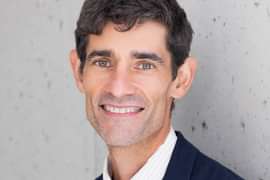
Spring 2024 issue will explore how Andover is shaping the future




